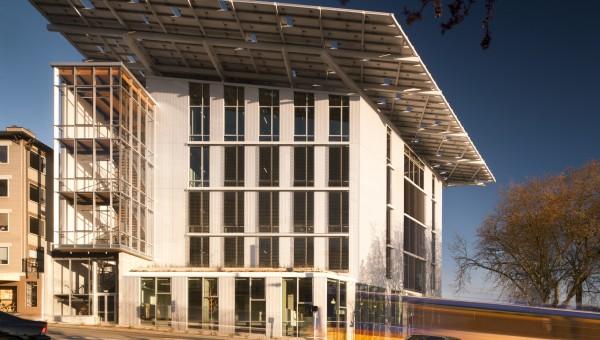The Bullitt Center in Seattle, which some say is the world's "most efficient" office building is not only influencing how other structures are built, it is contributing to revisions of codes and public policy.
The building’s design was made possible by Seattle’s Deep Green Pilot Program that allows builders to deviate from standard codes to build more sustainably. For example, the building was allowed to add two to three feet to the height of each floor to allow more daylighting. Neighbors objected to the additional 10 feet in overall building height, but the program permitted the non-conforming design.
Some of the building’s code deviations have been incorporated into the city code. For instance, the city council and the mayor had to approve changes to the building code to allow permits for “sustainability features.” This move allows the building’s solar canopy to extend all the way to the property line.
Bullitt Foundation, the environmental group that owns the building, recently signed a first-in-the-nation agreement with the local utility that will allow the foundation to sell Seattle City Light the energy it is saving or “negawatts.” The arrangement, known as MEETS (metered energy efficiency transaction structure) could be a pioneer in drawing investment funds to energy-efficiency projects.
Bullitt is also seeking final approvals from the county and state to turn the building into its own water district. That designation would allow tenants to drink rainwater collected on site and treated in the building’s basement.
(http://grist.org/business-technology/how-one-building-is-changing-the-world/)
Related Stories
Codes and Standards | Jan 9, 2023
EPA reverses course on clean water rule changes enacted by Trump administration
After long legal battles and extensive debate over the expansiveness of the Clean Water Act, the Environmental Protection Agency repealed changes enacted by the Trump administration.
Multifamily Housing | Dec 29, 2022
San Jose is largest U.S. city to abolish minimum parking for new housing
San Jose, Calif., recently became the largest U.S. city to strike down minimum parking requirements for new housing development. The city reversed zoning devised in the 1950s that reputedly gave it the worst sprawl of parking space in northern California.
Codes and Standards | Dec 29, 2022
New York City multifamily owners concerned over fires caused by e-bikes
In 2022, there have been nearly 200 fires and six deaths in New York City caused by lithium-ion batteries used in mobility devices such as electric bikes and scooters.
Sponsored | Resiliency | Dec 14, 2022
Flood protection: What building owners need to know to protect their properties
This course from Walter P Moore examines numerous flood protection approaches and building owner needs before delving into the flood protection process. Determining the flood resilience of a property can provide a good understanding of risk associated costs.
HVAC | Dec 13, 2022
Energy Management Institute launches online tool to connect building owners with HVAC contractors
The National Energy Management Institute Inc. (NEMI) along with the Biden administration’s Better Air in Buildings website have rolled out a resource to help building owners and managers, school districts, and other officials find HVAC contractors.
Green | Dec 9, 2022
Reaching carbon neutrality in building portfolios ranks high for organizations
Reaching carbon neutrality with their building portfolios ranks high in importance among sustainability goals for organizations responding to a Honeywell/Reuters survey of senior executives at 187 large, multinational corporations. Nearly nine in 10 respondents (87%) say that achieving carbon neutrality in their building portfolio is either extremely (58%) or somewhat (29%) important in relation to their overall ESG goals. Only 4% of respondents called it unimportant.
Green | Dec 9, 2022
Newly formed Net Zero Built Environment Council aims to decarbonize the built world
Global management consulting firm McKinsey recently launched the Net Zero Built Environment Council, a cross-sector coalition of industry stakeholders aiming to decarbonize the built world. The council’s chief goal is to collaboratively create new pathways to cut greenhouse gas emissions from buildings.
Energy Efficiency | Dec 6, 2022
Washington state’s Building Code Council mandates heat pumps in all new residential construction
The Washington State Building Code Council has voted to require heat pumps for all new residential construction starting in July 2023. The new mandate has drawn criticism over concerns that it will add costs to housing construction, especially given current supply chain challenges for heat pumps.
Geothermal Technology | Dec 6, 2022
Google spinoff uses pay-as-you-go business model to spur growth in geothermal systems
Dandelion Energy is turning to a pay-as-you-go plan similar to rooftop solar panel leasing to help property owners afford geothermal heat pump systems.
Contractors | Dec 6, 2022
Slow payments cost the construction industry $208 billion in 2022
The cost of floating payments for wages and invoices represents $208 billion in excess cost to the construction industry, a 53% increase from 2021, according to a survey by Rabbet, a provider of construction finance software.
















